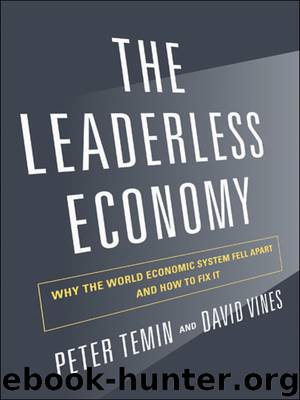The Leaderless Economy by Temin Peter; Vines David;

Author:Temin, Peter; Vines, David;
Language: eng
Format: epub
Publisher: Princeton University Press
Published: 2013-03-15T16:00:00+00:00
FIGURE 5.1 Spain: sectoral balances
Source: Oxford Economics / Haver Analytics.
FIGURE 5.2 Germany: sectoral balances
Source: Oxford Economics / Haver Analytics.
Germany, as shown in Figure 5.2, looks almost like a mirror image of Spain. The private sector saved abundantly in the 1980s and decreased its savings only gradually during the reunification process in the 1990s. The government—the public sector—ran deficits during the 1990s to finance reunification. Borrowing from abroad was minimal, but it was persistent, as Germany appeared to be uncompetitive with its trading partners. After the formation of EMU in 1999, private savings skyrocketed, in conjunction with an offset by an ever-increasing flow of financial investment abroad. Near the end of this period, these changes were augmented by a rapid increase in government savings. As a result, Germany had a growing surplus on current account; the resulting accumulation of foreign assets financed the Spanish boom.
Because Germany’s economy is larger than Spain’s, we cannot match the series in Figures 5.1 and 5.2; and Germany provided loans to other countries as well as Spain. But the interaction between Germany and Spain looks ominous. Each country is out of external balance, albeit in opposite directions.
We first need to ask why the current account of the balance of payments between member countries is an objective of policy in a monetary union. The balance of payments between Tuscany and Sicily is not an objective of policy in Italy. So why should it be in Europe?
Such a requirement for current account balance is clearly not a monthly or annual requirement. As countries experience different shocks, their economic activities may speed up or slow down. If speeding up in a country causes an increase in inflation, the resulting loss of competitiveness is supposed to set in train a natural equilibrating mechanism that brings the pace of growth in the country back to a level once again well adapted to the country’s needs. Interest rates under the common monetary policy were not involved, because they were common across EMU until recently. Current account balance is a condition that must hold in the longer term, because each country—and its government—must not build up too much debt. Foreign debts build up when a country’s current account deficit is large for a number of years in a row. Public debt is built up when a country’s government runs a significant deficit for a number of years. Markets will finance such debt buildups for a while, but at some point (perhaps rather late and rather suddenly), they will question whether politics in the country can deliver the sort of adjustment needed to set its debt back on a declining trend. In the following, we concentrate on foreign debt, although public debt is also important.
If a country earns less than it spends for many years because it is uncompetitive, it will be out of external balance, and it will accumulate foreign debts to pay for its imports. Tax revenues will shrink, and the government’s budgetary position will become difficult. There will be political pressures
Download
This site does not store any files on its server. We only index and link to content provided by other sites. Please contact the content providers to delete copyright contents if any and email us, we'll remove relevant links or contents immediately.
Pale Blue Dot by Carl Sagan(4994)
The Rules Do Not Apply by Ariel Levy(4953)
Goodbye Paradise(3795)
Ogilvy on Advertising by David Ogilvy(3598)
Liar's Poker by Michael Lewis(3440)
Delivering Happiness by Tony Hsieh(3417)
Into Thin Air by Jon Krakauer(3383)
Purple Cow by Seth Godin(3195)
Rogue Trader by Leeson Nick(3039)
The Social Psychology of Inequality by Unknown(3014)
The Airbnb Story by Leigh Gallagher(2850)
4 - Harry Potter and the Goblet of Fire by J.K. Rowling(2694)
The Mind Map Book by Tony Buzan(2570)
Bossypants by Tina Fey(2519)
Claridge's: The Cookbook by Nail Martyn & Erickson Meredith(2398)
All the President's Men by Carl Bernstein & Bob Woodward(2362)
Six Billion Shoppers by Porter Erisman(2292)
Master of the Game by Sidney Sheldon(2280)
Alibaba by Duncan Clark(2076)
